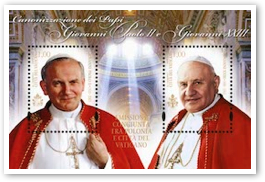The Joy of the Saints
- FATHER GEORGE W. RUTLER
The culminating evidence of sanctity is a joy that is not of this world.
 |
Our Lord kept his promise: "These things I have spoken to you, that my joy may be in you, and that your joy may be full" (John 15:11). Like "the peace of God, which surpasses all understanding" (Philippians 4:7), the fullness of joy transcends the ordinary experience of happiness and may not even fit the common expectation of pure happiness. The women at the empty tomb were "fearful but overjoyed" (Matthew: 28:8). As the "fullness of joy" is an anticipation of heaven, it will inevitably involve certain tension, so long as we are in time and space. To "burst with joy" or to "weep for joy" expresses the agony of ecstasy — the price paid for encountering perfection in an imperfect world. But in heaven there is no conflict or contradiction, no exasperation at not being able to contain joy.
The culminating evidence of sanctity is a joy that is not of this world. Saints always suffer in various ways as a consequence of their heroic virtue, which pits them against the "wickedness and snares of the Devil," but there is no such thing as a sad saint. The saints are proof of the existence of God and his mercy by their very lives, which are testimonies greater even than miracles or the logic of natural theology. On Divine Mercy Sunday, the Church rejoices and publicly recognizes by infallible decree the holiness of Saint John XXIII and Saint John Paul II. These are the first popes to be canonized since St. Pius X, who died in 1914 and was enrolled in the calendar of saints in 1954.
Every saint is different in personality and in ways of serving the Lord, and for that reason certain ones will strike a sympathetic chord more readily than others. Some would have been easy to live with, and others decidedly difficult, but failure to rejoice in their sanctity is a judgment against us rather than against them. There is a line no less perceptive for having been mistakenly attributed to Plato: "We can easily forgive the child who is afraid of the dark, but the real tragedy is the adult who is afraid of the light." Sanctifying grace enables the Light of Christ to shine not on, but through souls. "It is no longer I who live, but Christ who lives in me" (Galatians 2:20).
The Paschal candle having been lit, the joy of Easter continues, and as it does the Divine Mercy gives us new saints to help us through the valleys and hills of our days on earth. The motto of St. John XXIII was Oboedientia et Pax and that of St. John Paul II was Totus Tuus. Obedience to Christ brings peace, and if we give all we are to his mother, we will be able to rejoice with the saints.
 This is Meaghen Gonzalez, Editor of CERC. I hope you appreciated this piece. We curate these articles especially for believers like you.
This is Meaghen Gonzalez, Editor of CERC. I hope you appreciated this piece. We curate these articles especially for believers like you.
Please show your appreciation by making a $3 donation. CERC is entirely reader supported.

Acknowledgement
Father George W. Rutler. "The Joy of the Saints." From the Pastor (April 27, 2014).
Reprinted with permission of Father George W. Rutler.
The Author
 Father George W. Rutler is the pastor of St. Michael's church in New York City. He has written many books, including: The Wit and Wisdom of Father George Rutler, The Stories of Hymns, Hints of Heaven: The Parables of Christ and What They Mean for You, Principalities and Powers: Spiritual Combat 1942-1943, Cloud of Witnesses — Dead People I Knew When They Were Alive, Coincidentally: Unserious Reflections on Trivial Connections, A Crisis of Saints: Essays on People and Principles, Brightest and Best, and Adam Danced: The Cross and the Seven Deadly Sins.
Father George W. Rutler is the pastor of St. Michael's church in New York City. He has written many books, including: The Wit and Wisdom of Father George Rutler, The Stories of Hymns, Hints of Heaven: The Parables of Christ and What They Mean for You, Principalities and Powers: Spiritual Combat 1942-1943, Cloud of Witnesses — Dead People I Knew When They Were Alive, Coincidentally: Unserious Reflections on Trivial Connections, A Crisis of Saints: Essays on People and Principles, Brightest and Best, and Adam Danced: The Cross and the Seven Deadly Sins.




